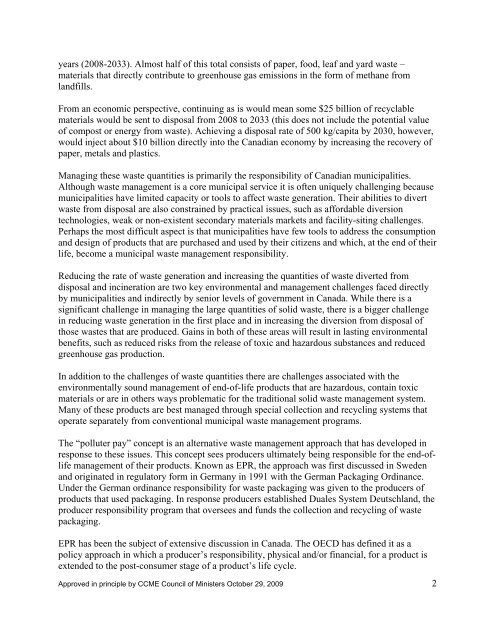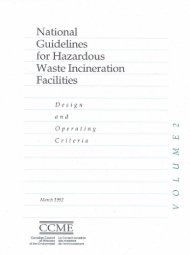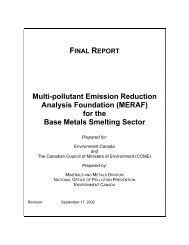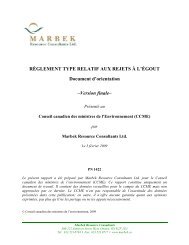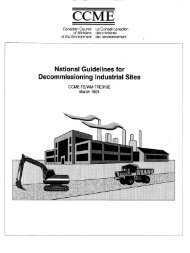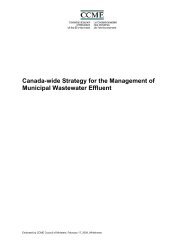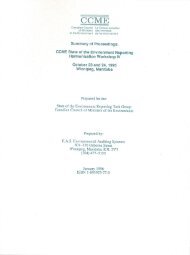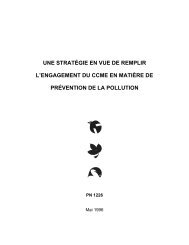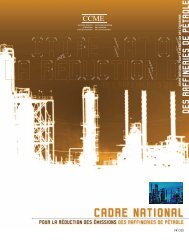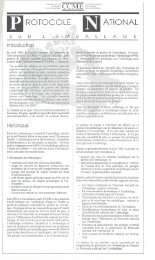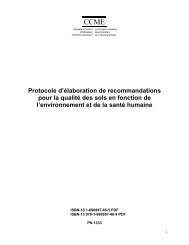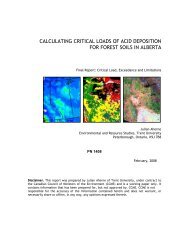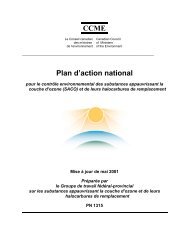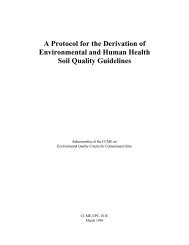Canada-Wide Action Plan for Extended Producer ... - CCME
Canada-Wide Action Plan for Extended Producer ... - CCME
Canada-Wide Action Plan for Extended Producer ... - CCME
Create successful ePaper yourself
Turn your PDF publications into a flip-book with our unique Google optimized e-Paper software.
years (2008-2033). Almost half of this total consists of paper, food, leaf and yard waste –<br />
materials that directly contribute to greenhouse gas emissions in the <strong>for</strong>m of methane from<br />
landfills.<br />
From an economic perspective, continuing as is would mean some $25 billion of recyclable<br />
materials would be sent to disposal from 2008 to 2033 (this does not include the potential value<br />
of compost or energy from waste). Achieving a disposal rate of 500 kg/capita by 2030, however,<br />
would inject about $10 billion directly into the Canadian economy by increasing the recovery of<br />
paper, metals and plastics.<br />
Managing these waste quantities is primarily the responsibility of Canadian municipalities.<br />
Although waste management is a core municipal service it is often uniquely challenging because<br />
municipalities have limited capacity or tools to affect waste generation. Their abilities to divert<br />
waste from disposal are also constrained by practical issues, such as af<strong>for</strong>dable diversion<br />
technologies, weak or non-existent secondary materials markets and facility-siting challenges.<br />
Perhaps the most difficult aspect is that municipalities have few tools to address the consumption<br />
and design of products that are purchased and used by their citizens and which, at the end of their<br />
life, become a municipal waste management responsibility.<br />
Reducing the rate of waste generation and increasing the quantities of waste diverted from<br />
disposal and incineration are two key environmental and management challenges faced directly<br />
by municipalities and indirectly by senior levels of government in <strong>Canada</strong>. While there is a<br />
significant challenge in managing the large quantities of solid waste, there is a bigger challenge<br />
in reducing waste generation in the first place and in increasing the diversion from disposal of<br />
those wastes that are produced. Gains in both of these areas will result in lasting environmental<br />
benefits, such as reduced risks from the release of toxic and hazardous substances and reduced<br />
greenhouse gas production.<br />
In addition to the challenges of waste quantities there are challenges associated with the<br />
environmentally sound management of end-of-life products that are hazardous, contain toxic<br />
materials or are in others ways problematic <strong>for</strong> the traditional solid waste management system.<br />
Many of these products are best managed through special collection and recycling systems that<br />
operate separately from conventional municipal waste management programs.<br />
The “polluter pay” concept is an alternative waste management approach that has developed in<br />
response to these issues. This concept sees producers ultimately being responsible <strong>for</strong> the end-oflife<br />
management of their products. Known as EPR, the approach was first discussed in Sweden<br />
and originated in regulatory <strong>for</strong>m in Germany in 1991 with the German Packaging Ordinance.<br />
Under the German ordinance responsibility <strong>for</strong> waste packaging was given to the producers of<br />
products that used packaging. In response producers established Duales System Deutschland, the<br />
producer responsibility program that oversees and funds the collection and recycling of waste<br />
packaging.<br />
EPR has been the subject of extensive discussion in <strong>Canada</strong>. The OECD has defined it as a<br />
policy approach in which a producer’s responsibility, physical and/or financial, <strong>for</strong> a product is<br />
extended to the post-consumer stage of a product’s life cycle.<br />
Approved in principle by <strong>CCME</strong> Council of Ministers October 29, 2009 2


